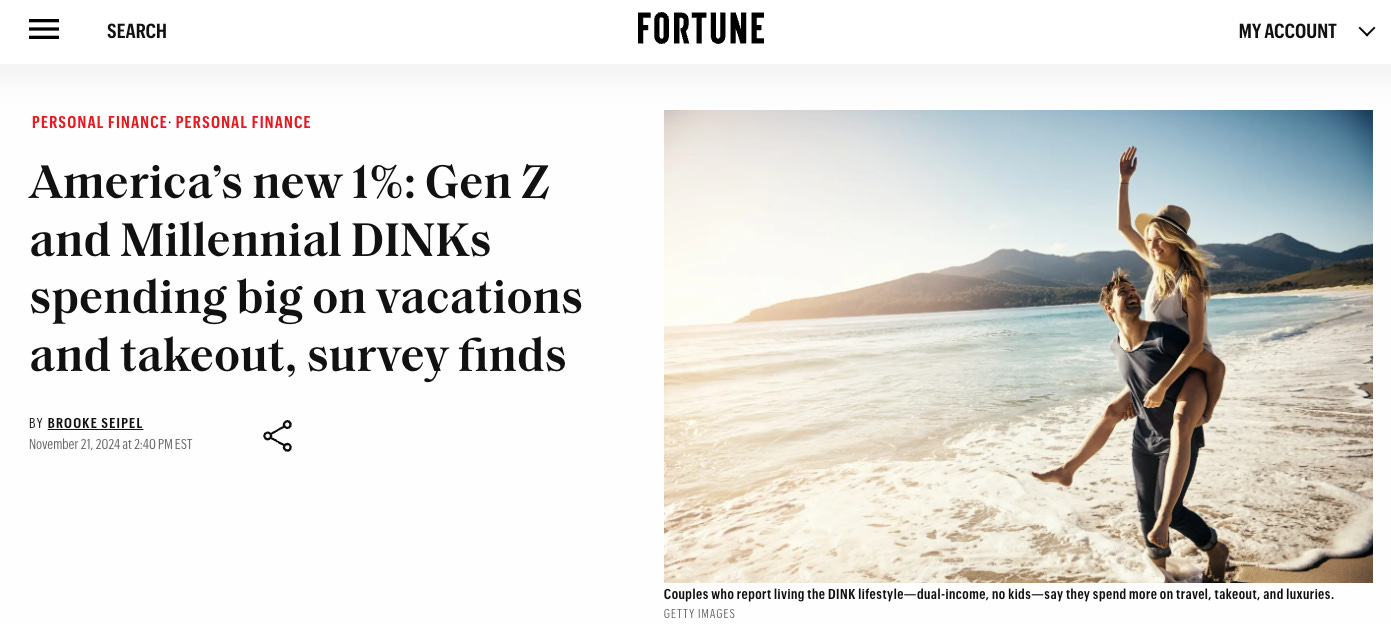Experience Rich: Why Young Americans Are Going DINK
Double income, no kids and new rules! Watch out :)
Young Americans have discovered a powerful hack for surviving modern capitalism: strategic partnering. Our latest research into DINKs (Dual Income No Kids), recently featured in Fortune and Forbes, showcases that 61% of DINK households bring in over $100,000 annually; this isn't just a demographic shift—it's the emergence of a new prosperity blueprint.
The Rise of Power Partnerships
When 60% of young singles are eyeing cohabitation as a financial strategy, it signals more than evolving dating preferences—it marks the rise of economic survival pacts. These aren't just relationships; they're financial alliances with benefits. In a world where 74% believe having children would derail their financial stability, these partnerships look as much like a lifestyle choice as a calculated path to prosperity.

“The data reveals DINKs aren’t just spending more—they’re spending differently, with an emphasis on experiences that enhance their partnerships and personal growth,” Libby Rodney, chief strategy officer at the Harris Poll. “It’s a segment that’s redefined discretionary spending as an investment in life experience.” Featured in Fortune
Double the Luxury: The DINK Spending Formula
Let's break down how DINKs are reshaping spending:
2x: They're willing to spend $2,173 on luxury vacation packages, almost double what average Americans spend
3x: They're willing to spend $531 on airplane seat upgrades, nearly triple what average Americans invest in comfort
3x: They're spending $784 on exclusive memberships (country clubs, private gyms), three times more than average Americans
4x: They're spending nearly four times more on dining than the average American ($816 vs. $215 monthly)
83% report, "I appreciate the freedom and flexibility not having children gives me"
88% direct their income toward enriching experiences and self-development
76% credit their child-free status for enabling frequent and spontaneous travel
Their median net worth of $399,000 is $150,000 more than couples with children
For many DINKs, pets have become the new focus of their nurturing instincts and discretionary spending. The trend has become so prevalent on TikTok that couples have coined the term #DINKWADs (Dual Income No Kids With a Dog), sparking viral trends of incredibly spoiled pups living their best only-child lives. This evolution makes perfect sense if you read our recent analysis' on how Gen Z is spending $6,103 annually on their pets (nearly triple what Boomers spend). When 82% of pet owners see their pets as children and a third would trade $100,000 for more time with their pets, the DINKWAD phenomenon isn't just a viral hashtag—it reflects how young couples are redefining family in real-time.

The Next Big Think: Signals To Watch
1. The New Partnership Architecture
Financial trauma-bonding becoming the new romance, with 60% of young singles eyeing cohabitation as an economic strategy
Social rituals are being rewritten around shared wealth-building rather than family-building
2. Success Indicators: Stability + Freedom
Readiness for new definitions of adult success: 83% of DINKs report, "I appreciate the freedom and flexibility not having children gives me."
Emerging white space in financial products and services: 64% of DINKs report money is a tool for enjoying their life, 14 percentage points higher than average Americans
Think beyond traditional linear family-focused offerings to focus on stability-building growth opportunities
3. Cultural Code Shifts
74% see children as a threat to financial stability (side note: Children need PR help)
Status signaling in partnership; luxury habits, experiences, passions, pets, and investment portfolios
Why This Matters
This isn't just about timing life milestones—it's about maximizing a period where young people can feel and experience an affluent lifestyle. While 65% of Gen Z and Millennial DINKs view this as a temporary phase before children, a significant 35% are choosing this as their long-term lifestyle.
For brands, this presents a golden opportunity: DINKs are actively seeking to build their "experience portfolio" with maximum financial flexibility. Products and services aren't just luxuries—they're essential components of living richly in the moment. Whether it's premium travel, exclusive memberships, or high-end dining, brands aren't just selling products—they're enabling a generation to maximize their experience-rich years, transforming how we define and pursue a fulfilled life.
Shout out to Marie Aloi and Tim Osiecki for leading this research!
3 Links
The 2024 Gen Z Gift Guide, According to TikTok (After School by Casey Lewis)
Older women are changing the face of the U.S. labor force (Washington Post)
Thanks for reading The Next Big Think! Subscribe for free to receive new posts and support my work.
Subscribed
Curiosity is contagious; if you like this newsletter, please share it!!
Penned by Libby Rodney and Abbey Lunney, founders of the Thought Leadership Group at The Harris Poll. To learn more about the Thought Leadership Practice, just contact one of us or find out more here.
Thanks for reading The Next Big Think! Subscribe for free to receive new posts and support my work.






